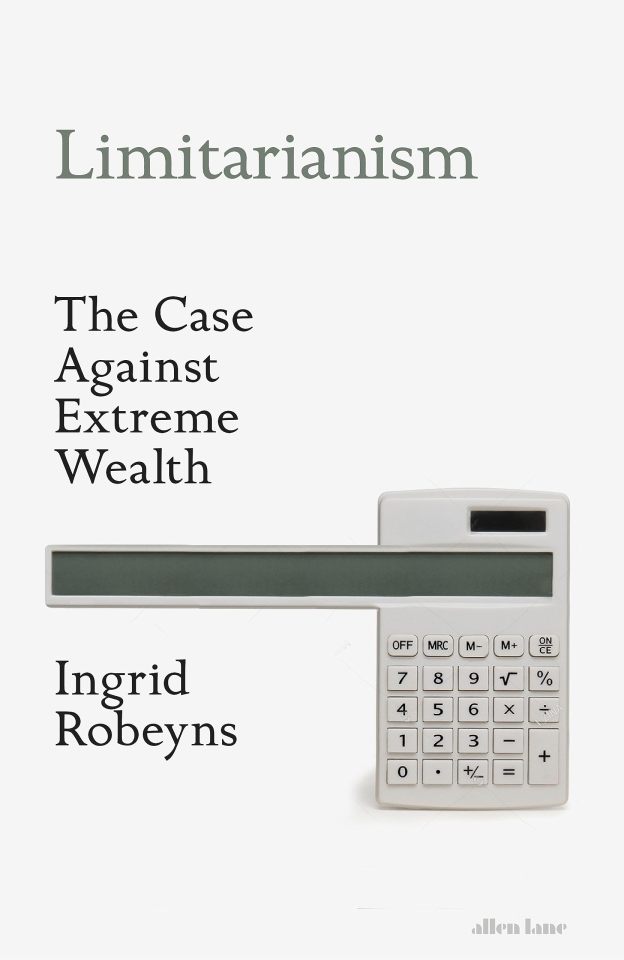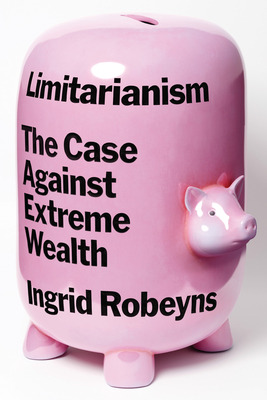#limitarianism
Text
The earnings of the ultra-rich are literally unearned. This isn’t a value judgment: it’s the US tax agency’s term for money made through “investment-type income such as taxable interest, ordinary dividends and capital gain distributions”. While Astor and Rockefeller surely followed the wealth-maximising maxim of buy low, sell high, and put money in trusts, charities and other vehicles to minimise taxation, we’ve seen this logic taken to the next level, without policy changes to correct for it.
Most of us pay tax on our incomes at double-digit rates; if we’re fortunate enough to own assets, we pay tax on the profits when we sell them. Billionaires, on the other hand, “can borrow against their growing investments year after year without owing a dime in taxes, allowing them to pay lower tax rates on their income than ordinary Americans pay on theirs”. That statement doesn’t come from Bernie Sanders, by the way, but from the achingly centrist White House, which in 2022 proposed a 20% minimum tax on households worth more than $100m. It went nowhere, in part because its subjects so strongly opposed it.
The impending arrival of the trillionaire signals another step backwards in the fight for a more balanced economy and healthier democracy. The billionaire class, after all, skews the balance of power in the marketplace, in politics and in society. Its members own newspapers that shape public opinion. They donate to politicians who pass the laws that they want. According to one study, 11% of the world’s billionaires have held or sought political office, with the rate of “billionaire participation” in autocracies hitting an astounding 29%. Another study shows they tend to lean to the right: positions that typically help them keep their own wealth, and that of their peers, intact.
141 notes
·
View notes
Text

Limitarianism: The Case Against Extreme Wealth
By Ingrid Robeyns.
Design by Jamie Keenan.
2 notes
·
View notes
Text
Review: Limitarianism
Review: Limitarianism by Ingrid Robeyns from Astra House
#extremewealth #economics #limitarianism #eattherich
Billionaires shouldn’t exist. It feels weird for me to write that sentence even though I intellectually know it to be true. My younger, conservative self would be dumbfounded if he knew he would one day write those words. But they are the truth. Extreme wealth has thrown society out of balance in many ways. It was something I began to suspect long before Elon’s very public and ongoing mental…

View On WordPress
#Astra House#Book Reviews#Books#europe#Highly Recommended#history#Ingrid Robeyns#learning#Limitarianism#politics#Reading#Recommended#Review#The Case Against Extreme Wealth
0 notes
Text
Fucking my ex GF
Ts girl blows like hell previous to riding perfect male cock
Tori Black Fucks Her Boss
British milf Devon Breeze fingers her fine fanny
sex with voice
Lesbian boss licks her curious housemaid
Teen with a soaked ass gets nailed during a massage
he likes sex with his tattooed ass
Gf playing with my dick while watching Fortnite
High school fuck with teacher นักเรียนแอบเย็ดกับครู
#self-regardant#whirled#balandrana#Franco-#calaba#rehousing#septemia#overflogging#vanitarianism#Pselaphus#disturbers#Onchidium#hircocervus#Calvano#johnboats#simulcasting#bromidically#subgoal's#limitarian#helicin
0 notes
Text
17 notes
·
View notes
Text
"The thought of capping wealth is intuitively disquieting because it contradicts some of American culture’s most deeply held beliefs. If extreme wealth is no longer aspirational, what else should we strive for? Will we lose all ambition if the prospect of material gain goes away? If we didn’t earn what we have, how do we measure our worth?"
Hmmm....
#idk#a society that does away with the pursuit of wealth.#Like on a small local scale that to me brings to mind something like monastics monks living in an abbey#But I couldnt tell you what that would look like on a state or national scale#interesting food for thought
11 notes
·
View notes
Text
We will never know!
The rich and their bought and paid for GOP will never admit that under the old tax laws the rich were forced to pay. They were still incredibly rich
5 notes
·
View notes
Text
Open To Debate Podcast: Does Taylor Swift (Or Anyone) Deserve A Billion Dollars?

This week, the nonpartisan debate podcast Open to Debate released an episode debating the question: “Does Taylor Swift Deserve Her Billion Dollar Fortune?”
The Open To Debate podcast plays a critical role in our society today.
Open to Debate is a call to action: All of us should keep an open mind to solve the complex problems we face as individuals and as a nation.
Open to Debate is a reminder: To solve our greatest problems, we must operate in a contempt-free zone. We need to be able to sit in the same room and exchange ideas with people we disagree with. Being open to debate is a gesture of respect for the good faith arguments of those we disagree with, for the intelligence and integrity of those who watch or listen, and for the value of debate done right.
Open to Debate is a duty: The future of American Democracy depends on the strength of communities to work together and overcome our differences. “Us vs. Them” thinking is destructive to our social fabric, and we need a national model to guide debates to a healthy and free exchange of ideas.
The mission of Open to Debate is to restore critical thinking, facts, reason, and civility to America’s public square. Open to Debate is a platform for intellectually curious and open-minded people to engage with others holding opposing views on complex issues. Check out Open To Debate. Perhaps you'll have a prejudice exposed or a firmly held belief questioned.
Swift — declared officially a billionaire by Bloomberg and Forbes last fall, generated broader questions about whether billionaires are a policy failure and debate various philosophies about the distribution of wealth.
"All of this stuff that Taylor has done for the world is priceless —you can't put a price tag on how influential and important her work has been to so many people,"” argues Political Philosopher Jessica Flanigan, author of an upcoming book about the philosophy behind Taylor Swift's music. “
"A society that produces billionaires like Taylor Swift is good for everybody," says Flanigan.
“No matter how amazing a person Taylor Swift is, she shouldn't’t be a billionaire because no one should be a billionaire,” counters Ingrid Robeyns, author of the book Limitarianism: The Case Against Extreme Wealth.
"We focus here on an individual, but really the bigger question is: What kind of society do we want?" asks Robeyns.
Joining the conversation to ask questions and test the debaters' arguments are Anne Helen Petersen (Culture Study), Abha Bhattarai (Washington Post), Richard Wolff (UMass Amherst), Allison Schrager (Manhattan Institute), and Zack O'Malley Greenburg (Zogblog).
Read a recap of the taping in Fast Company.
Listen to the full episode at opentodebate.org (with video) or wherever you get podcasts.
And for those of you who have watched too much of a certain news network and actually believe that Taylor Swift is a CIA spy or Deep State operative, I recommend you detox on cat videos or music videos from the 80s.
0 notes
Text
This is such an important topic that should be discussed more.
0 notes
Text
Limitarianism: The Case Against Extreme Wealth: Ingrid Robeyns
https://www.hive.co.uk/Product/Ingrid-Robeyns/Limitarianism--The-Case-Against-Extreme-Wealth/28866492
0 notes
Text
0 notes
Quote
Individually and collectively, it is time to decide what “enough” looks like, and how to know when we’ve achieved it.
There’s a name for this approach, coined by the Belgian philosopher Ingrid Robeyns: limitarianism. Robeyns argues that there should be an upper limit to the amount of income and wealth a person can amass. Just as we recognise a poverty line, below which no one should fall, we should recognise a riches line, above which no one should rise. This call for a levelling down is perhaps the most blasphemous idea in contemporary discourse.
But her arguments are sound. Surplus money allows some people to exercise inordinate power over others: in the workplace; in politics; and above all in the capture, use and destruction of the planet’s natural wealth. If everyone is to flourish, we cannot afford the rich. Nor can we afford our own aspirations, which the culture of wealth maximisation encourages.
“For the sake of life on Earth, we must put a limit on wealth”, George Monbiot (The Guardian)
2 notes
·
View notes
Photo

Coronavirus: Design Priorities
The pandemic has escalated many of WGSN's forecasts, as wellness, comfort, protection and limitarianism become amplified consumer priorities. Here we revisit our 2020/21 design priorities
2020 will define the future of fashion. The industry is already in the process of significant transformation, but now as many parts of the world move into anti-viral lockdown, coronavirus becomes the catalyst for truly seismic change.
The human impact gives a new perspective on consumption habits, so expect your consumer to develop new priorities, from limitarianism to the need for protection and comfort. Whether it's the politically woke Gen Z or newly vulnerable Boomers, customers will be looking for better connections with their products and will spend with greater intention. This is not a crisis we can sell our way out of, we need to design our way through it with thoughtful product. Dedicating more resources to research and development will help to future-proof your business.
The trend strategies which address coronavirus are tightly aligned with the other great threat to humanity, the environmental crisis

As people shift to working from home, the need to heat or cool our homes increases. Both from a personal expenditure and environmental point of view, this is a cost reduced. The climate emergency has already thrown up extreme weather, requiring better thermoregulated apparel which now serves to warm or cool the wearer while working at home.
Climate Adaptive: intuitive fabrics will take the hassle out of temperature management, reacting automatically to conditions.
Duvet Day: erratic weather patterns require year-round protection. Offer mid-layer qualities as removable items.
Mineral Protection: this new generation of mineral-infused fibres will reflect UV and pollution from the body, keeping a cooler temperature throughout summer.
Pocketed Constructions: these fabrics work to thermoregulate, retaining air and therefore insulation.
Body-Reactive Comfort: density and temperature will be the leaders in defining this new comfort, as fabrics adjust in response to the body, becoming warmer or cooler.
more: https://www.wgsn.com/
#coronavirus design wgsn consumer designpriorities pandemic footwear sportwear#genZ#boomers#climate people covid19
1 note
·
View note